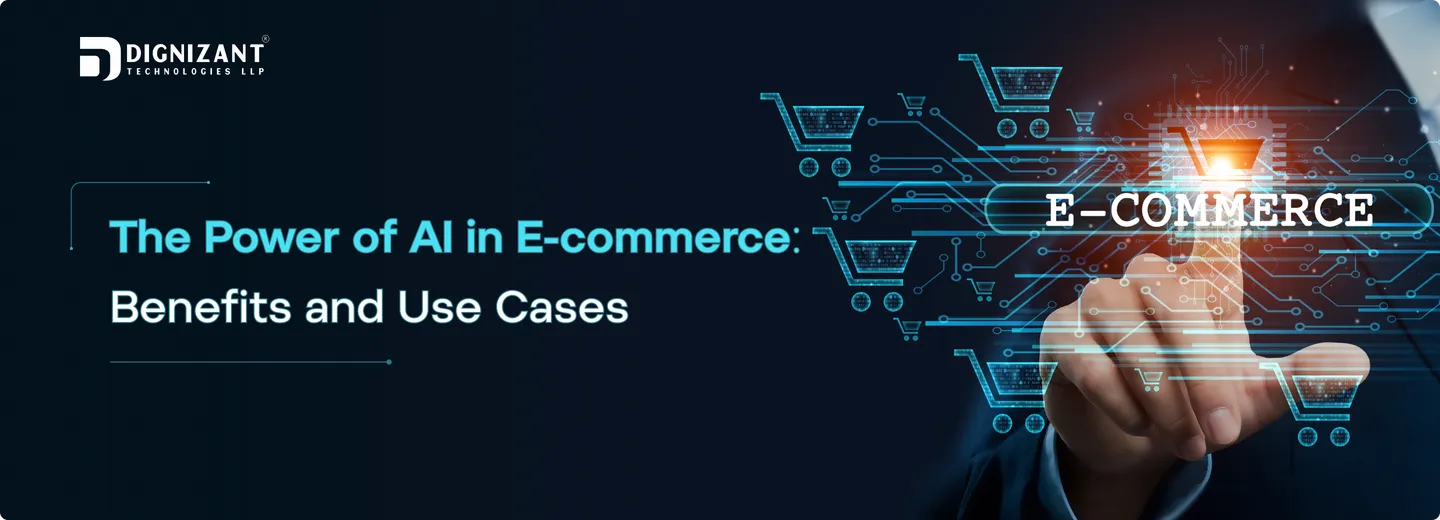The Power of AI in E-commerce: Benefits and Use Cases

Contributor
Vinil Joseph
Uploaded
30 September, 2025
Read Time
5 Minutes
E-commerce is a rapidly expanding industry, but with growth, there are challenges. Consumers demand instant answers, precise product outlines and quicker delivery while businesses require to deal with vast data sets, global competition and ever-rising customer demands. Enter Artificial Intelligence (AI) , the quietly advancing technology that will soon power online retail.
AI in e-commerce is not just automation, it’s intelligence that learns from data, forecasts customer behavior, and optimizes every stage of shopping. From recommendation engines for products and fraud avoidance to logistics optimization, AI is fundamentally changing how businesses run.
Excellent ecommerce software development can enable brands to seamlessly implement AI-powered features that provide smarter, faster and more valuable experiences which keep a customer retained.
In this blog, let’s explore how AI is redefining e-commerce, its benefits, practical use cases, and what the future holds.
Why AI Matters in E-commerce
E-commerce produces terabytes of data: daily search queries, clicks, purchases, reviews and returns. No matter the platform, human decision-making alone isn’t capable of dealing with this scale. AI converts this raw data into actionable intelligence by:
- Patterns learning: Knowing what customers love, purchase or let go by.
- Outcomes: Forecasting supply and demand and market trends.
- Automation: Streamlining back and forth interactions (e.g., customer queries).
- Customizing experiences: Ensuring that each and every customer is catered to as an individual.
The result? More intelligent operations, more satisfied customers and a healthier bottom line.
Benefits of AI in E-commerce
1. Tailored Shopping Journeys
The “one-size-fits-all” product display days are long gone. For each shopper, AI customizes the shopping journey relying on browsing behavior, past purchases and interests. Customers spot products they are more likely to purchase, generating a rarefied and personal feel.
- Impact: Increased percentage of visitors who convert and better customer retention.
2. Intelligent Search and Discovery
Customers will frequently abandon the cart if they can’t find the right product quickly. AI enhances search with:
- Voice search: Shoppers ask their questions verbally.
- Visual search: Take a picture to find similar items.
- Context-awareness: AI processes intent, not just keywords.
This also makes product discovery fun and easy.
3. Smarter Decision-Making with Predictive Analytics
AI can predict sales, optimize stock levels, and even show which promotions will succeed. Intuition is no longer enough for retailers, now data-driven decisions can allow them to take far less risk and earn returns that are much, much higher.
4. Always-On Customer Support
AI-driven chatbots respond instantly to queries be it for order tracking, refunds or recommendations. Unlike human teams that take breaks, they don’t stop working 24/7 and allow customers to feel supported whenever.
Example: A bot recommending “backup” items when a product is sold out.
5. Fraud Detection and Secure Transactions
AI detects suspicious activities like repeated failed attempts to log in and abnormal purchase behavior. It helps to eliminate fraud and establish trust with the customer through real time pattern analysis.
6. Dynamic Pricing for Competitiveness
AI monitors competitor pricing, customer demand and market conditions to allow dynamic price adjustments. It enables businesses to stay in the game without giving up their margins.
7. Efficient Supply Chain and Logistics
Delivering late can break customer confidence. AI forecasts demand, optimizes warehouse management and even discovers more efficient delivery routes. This results in lower costs and quicker delivery.
Use Cases of AI in E-commerce
1. Personalized Product Recommendations
One of the more common, yet impactful uses of AI. Customers are more likely to buy when they see products that mirror their individual behaviors.
Example: Amazon’s recommendation engine accounts for a huge part of its sales.
2. Virtual Try-On and Augmented Reality Shopping
AI, paired with AR, enables customers to imagine how products fit into their lives before they make a purchase.
Example: Sephora’s app enables users to see what they would look like in makeup shades.
Example: IKEA Place demonstrates what furniture would seem like in a room.
3. Voice Commerce
As smart speakers gain in popularity, consumers are using voice commands to order groceries, clothes or electronics.
Example: Walmart’s tie-up with Google on voice-activated shopping.
4. AI Chatbots and Virtual Assistants
AI chatbots do more than simply answer FAQs they serve as shopping assistants, recommending products and even giving assistance checking out or support.
Example: H&M’s chatbot guides customers in styling outfits and browsing collections.
5. Sentiment Analysis
AI tools analyze reviews, ratings and social media buzz to learn how customers feel about a brand or product. This enables enterprises to take action on problems early and provide better services.
6. Inventory and Demand Forecasting
AI also predicts what will sell quickly, so businesses keep the right stock levels. This reduces garbage and boosts sales.
Example: AI in fashion predicting next season’s trends.
7. Automated Email Marketing
AI groups users into databases and auto-sends customized emails with smart recommendations, reminders and discounts. This drives ongoing engagement and repeat purchase.
8. Fraud Prevention in Payments
AI watches for patterns in transactions that signal fraud. When the activity is suspicious, alerts or blocks are generated and both the customer and shopkeeper stay safe.
The Future of AI in E-commerce
Artificial intelligence is just getting started, in terms of what it can do. Upcoming trends include:
- Emotion AI: Identifying emotions in a customer’s voice or on their face to enable empathetic engagement.
- Conversational Commerce 2.0: More natural, humanistic virtual shopping assistants.
- Blockchain and AI: Fraud-free transactions, secure and clear.
- Sustainable with AI: How to build greener supply chains.
The future delivers smart, personal and sustainable shopping.
Challenges Businesses Face with AI
Despite its promise, implementing AI poses challenges:
- High Initial Investment – Small Budget Businesses can be expensive.
- Data Privacy – Compliance with regulations such as GDPR needs to be done.
- Integration Hurdles – AI needs to be compatible with and work seamlessly along existing platforms.
- Data Quality – AI results are directly proportional to the quality of the data.
Only strategic foresight and reliable technology partners can defeat them.
Conclusion:
The immediate potential of AI in e-commerce is to make shopping smarter, faster and more personal. It’s good for businesses and customers alike. Retailers get greater efficiency and profits shoppers, convenience and personalization.
From chatbots to predictive analytics and visual search, AI is changing every corner of ecommerce. Businesses using innovative ecommerce web development can leverage these advances to get ahead in the game. Early adopters of AI will enjoy a significant competitive advantage, companies that are slow to adopt, on the other hand, risk being left behind in an economy where digital is first.
Latest Articles

Explore how Flutter powers scalable, high performance cross platform apps with expressive UI, reduced costs, and faster time to market.

React vs Vue Comparison guide covering React JS vs Vue JS features, performance, learning curve, and use cases to choose the right framework in 2026.

Understand how modern web development drives scalable growth by improving speed, flexibility, security, and long-term digital performance.
FAQs
Ready to Take Your Business to the Next Level?
Unlock new opportunities with expert solutions designed to elevate your brand. From strategy to execution, we empower your business with the tools, technology and talent it needs to thrive in today’s digital world.




